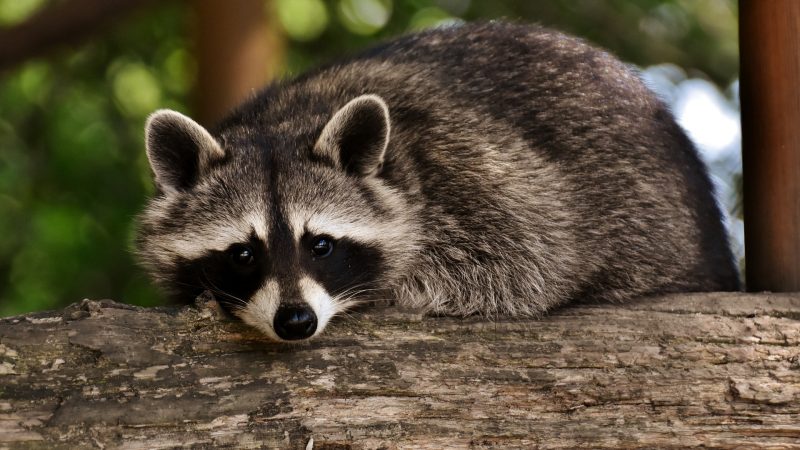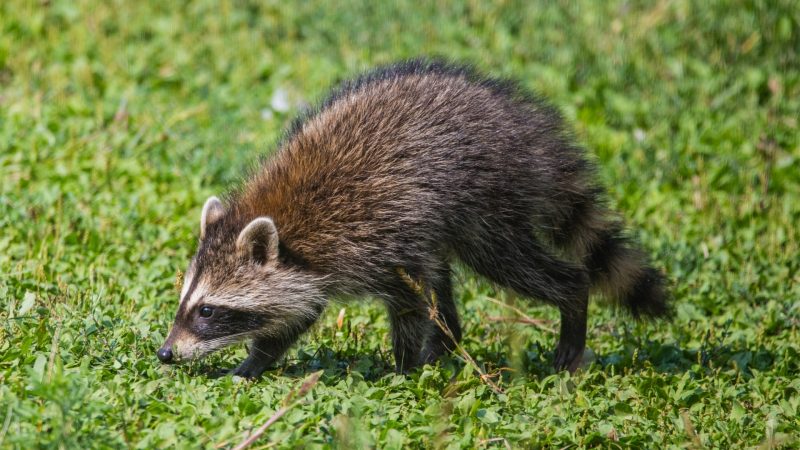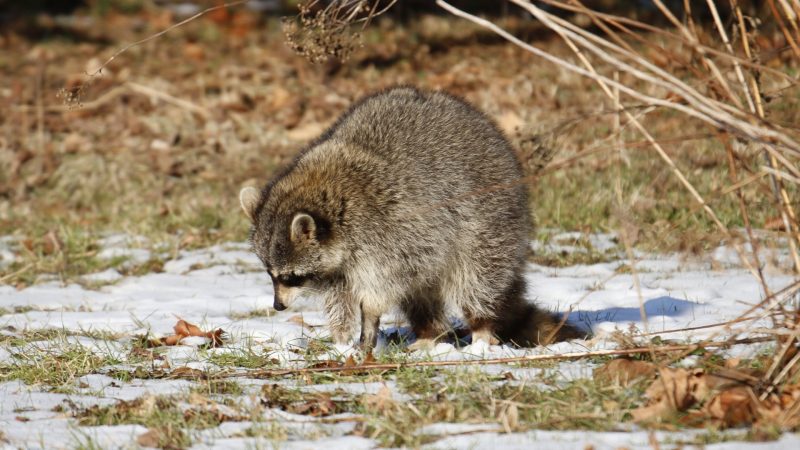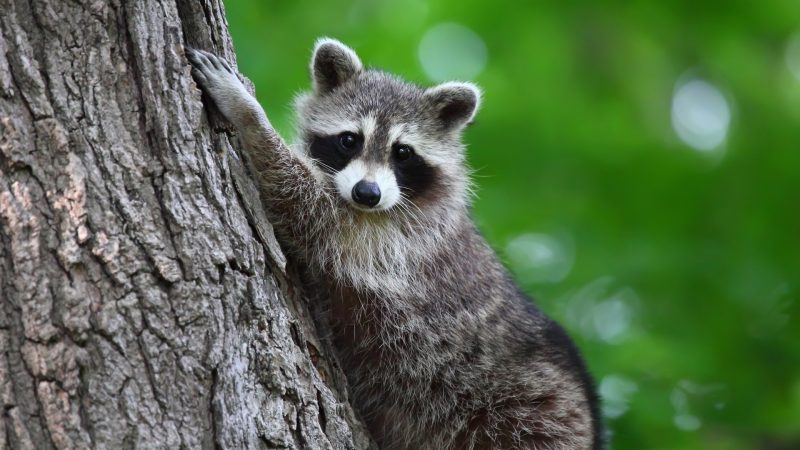Raccoons are mostly nocturnal mammals (active at night) and you can easily know their presence in the dark, even if you don’t see them. This is because raccoons are very noisy creatures, producing many different kinds of sounds.
What do raccoons sound like? Raccoons scream is similar to the sound of an owl screeching at night. The sound of fighting raccoons is also almost the same as the sound of fighting cats. They can produce about 100 different sounds.
Interestingly, raccoons of all ages can produce different kinds of noises. Baby raccoons, also called kits, have also their own set of sounds to call their mother. As a homeowner, you should be able to identify raccoon sounds so you can take proper action faster. Read on to learn more.
How Do Raccoons Communicate?

Generally speaking, raccoons communicate with each other in three different ways – scent marking, visual displays, and by creating sounds. In doing so, these fur-bearing creatures can convey a message, send signals, and express their emotions to their comrades and the opposite sex.
1. Scent Marking
Raccoon droppings and urine emit very foul odors and can transmit infectious diseases such as Leptospirosis and Salmonella. This is why you should not touch them or go near them without the proper PPE (personal protective equipment). But for raccoons, the annoying odor is like leaving a message.
Once a raccoon smells another raccoon’s poop, it tells him that the area already has an “owner.” Aside from feces, male raccoons also rub their behinds on any area they want to claim as their territory. While doing this, their anal glands release a substance with a very unique scent; but you won’t be able to smell it.
Related: Raccoon Feces (Toxicity, Dangers, and Diseases) | Control and Prevention
2. Visual Displays
As a part of their social behavior, raccoons show some visual displays to show their emotions. For example, a threatened raccoon may lower its head, lash its tail, and erect its fur. Nonetheless, these motor patterns can also be signs that they may fight back. In most cases, they will also scream, hiss, and growl.
Raccoons are also masters of various facial expressions. While they look cute in photos, these “bandit-masked” thieves use their conspicuous facial coloration to recognize each other. Male raccoons also use this technique to court females. They usually mate with lots of females and leave them to take care of the young.
3. Creating Sounds
As mentioned above, raccoons can produce a wide variety of sounds. These raccoon sounds may sound like other animal sounds but are still unique in many aspects. Some of their sounds are odd and creepy, especially when they are distressed or angry. They also create violent sounds when mating.
Raccoons are excellent climbers, too. They climb tall trees using their sharp claws to avoid predators. Among them are foxes, wolves, pumas, coyotes, and bears. But when cornered, these shy animals will also create a series of weird sounds. And as danger comes closer, their sounds will be louder and longer.
What Kind of Sounds Do Raccoons Make?
Raccoons make sounds mostly at night, and they can wake you up if they are in your chimney or attic. They are solitary animals, but females usually nest together, especially when they are caring for their young. This is why you rarely hear one raccoon only. Here are some of the common sounds raccoons make.
1. Screeching Like an Owl
Raccoons screech and scream for various reasons. If you hear raccoons screeching like an owl, they can either be fighting or mating. Sometimes, they may also sound like two cats fighting in your attic. Some distressed raccoons may also scream and screech if they are calling each other’s attention.
2. Barking Like a Dog
Aside from growling, raccoons bark like dogs while they are eating. This feeding habit suggests that they are excited to eat or starving for food. You may hear raccoons barking while eating left-over foods in your trash can. Sometimes, they continue to bark after eating. This means that they were satisfied with the food.
3. Growling Like a Wolf
Raccoons growl like a wolf when they are angry or trying to defend themselves from humans. But don’t worry; they are very unlikely to attack humans. However, female raccoons will growl at you if they see you approaching their young. In case you don’t know, female raccoons are caring and very protective mothers.
4. Hissing Like a Cat
Raccoons hissing like a cat can be a sign of aggressive or protective behavior. They usually hiss and may also whistle when they sense danger is approaching. Nevertheless, this is also common to baby raccoons because their vocals are not yet capable of screaming. They hiss a lot if their mother is not around for them.
5. Chittering Like a Bird
Mother raccoons usually chirp or chatter like a bird when they are trying to calm their kits or responding to their calls. Once you hear this sound, the mother raccoon may have just returned to their nest after searching for food or a new place to stay. Female raccoons also usually chirp to attract the males to mate.
6. Movement Noises
Aside from voices, raccoons also create different sounds while they are moving inside your house. These noises are very credible signs that you already have some raccoons in your attic. This includes scratching of walls, thumping from the roof, rustling in garbage cans, and dragging up to your chimney.
What Do Baby Raccoons Sound Like?

As mentioned above, baby raccoons are still too young to scream. But aside from hissing when they sense danger, kits also cry, chitter, whimper, whine, and purr like a kitten to call their mother. They also purr to show affection when their mom is licking them or nibbling on them. Mother raccoons also purr as a response.
Note, however, that baby raccoons cannot survive without their mother. Therefore, if you plan to evict raccoons from your house, make sure that the kits are with their mother. If you leave them behind, they will die in hunger and rot. Their carcasses will not only attract flies; they can also transmit infectious diseases.
What Do Rabid Raccoons Sound Like?

Raccoons are widely known for carrying rabies. Most of the time, a rabid raccoon is characterized by erratic wandering, having a discharge in their mouth and eyes, and making strange, loud noises. This includes screaming, screeching, and excessive barking even if they are alone and there is no imminent danger.
However, some rabid raccoons may also create sounds similar to healthy ones. Therefore, look also at their physical appearance. An infected raccoon usually has paralyzed legs and looks disoriented. Raccoons rarely attack humans, but rabid raccoons may attack you even if you did not provoke them.
What Sounds That Scare Raccoons Away?

Ironically, raccoons are scared of loud noises that are unfamiliar to them. They are not considered endangered species, but they are protected by law. Therefore, you cannot kill them even if they cause damage to your property. So if you want to get rid of them, here are some sounds that can help you drive them away:
1. A Loud Radio
Use radio and make the volume level very high. Aside from being annoyed with loud music, raccoons may also leave if they hear the voices of radio DJs and announcers. You may also switch stations or move the radio to another location.
2. Wind Chimes
Wind chimes may not create loud noises, but their deep, soothing tones are ideal for startling raccoons. To confuse the raccoons, you may change the sound of the chimes to high-pitch tones and then back to low tones.
3. Predator Sounds
Raccoons are very scared of their predators. So, try recording some of their scary sounds. This includes the growling of wolves, the yipping of coyotes, and flying owls. Instead of placing the speaker near your house, put it on a tree.
4. Barking Dogs
Raccoons are not scared of dogs, and they may even fight back if your dog is small. However, raccoons get scared when they hear a dog barking or when a big dog chases them. Therefore, you can also use the sound of a barking dog.
5. Firecrackers
Firecrackers may be only for short-term noise, but they are loud enough to surprise raccoons and scare them away. Their sudden spark of bright lights can also add fear to them. Just don’t throw the firecrackers directly at them.
6. Pans and Pots
If you don’t want to use firecrackers, you can also use metal pans and pots. Simply knock them aloud or hit them with another metal to create a loud noise. Raccoons nearby will surely run away as fast as they can.
7. Shouting or Clapping
If you don’t have anything near you and you saw a raccoon, you can also clap or shout at the animal. However, this is also a temporary solution only. Some raccoons may soon return once you stop clapping or shouting.
Summary
Raccoon infestation can lead to bigger problems. Aside from the diseases you can get from them, raccoons can also cause huge damages to your property. Fortunately, you can easily get rid of them if you can distinguish their sounds, and find where they are coming from. But then, make sure you are obeying the law.
List of Sources
Saunders, D. A. (1988). Raccoon. State University of New York, College of Environmental Science and Forestry.
Raccoons: Damage Management. Iowa State University.
How Animals Communicate. Minnesota Valley National Wildlife Refuge.
- How to Get Rid of Copperheads | Practical Guide - August 27, 2023
- How to Get Rid of Corn Snakes | What Makes Them Aggressive? - August 27, 2023
- How to Get Rid of Alligators | Safety Measures and Removal Methods - July 16, 2023
